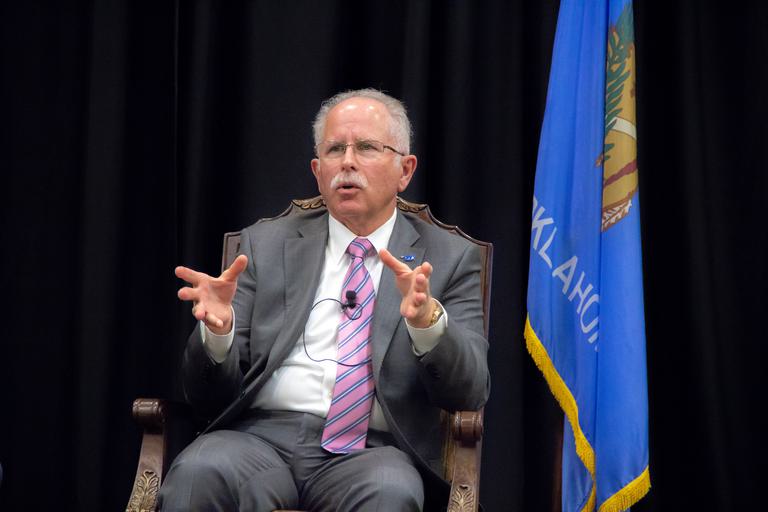
Law & Principles
Ray Carter | April 16, 2019
Janus tells OKC audience workers’ rights not yet secure
Ray Carter
As the plaintiff in a U.S. Supreme Court case that successfully challenged forced payment of union dues by government workers, Illinois resident Mark Janus’ last name has become synonymous with workers’ rights.
But during a Tuesday afternoon presentation in Oklahoma City, he said there’s still much work to do before the rights clarified by the U.S. Supreme Court are enjoyed in practice by all.
“We’re seeing people that have been trying to exercise their ‘Janus rights,’ as it’s now known, and they’re not allowed to,” Janus said.
Janus first worked for the state of Illinois in the 1980s in a position not covered by collective bargaining, then worked in the private sector for several years. He returned to a state position in health and family services in 2007 and soon found he was a union member, like it or not.
“Nothing was ever said during the HR intake of unionism or anything of that nature,” Janus recalled. “I never signed a pledge card. Nobody ever said anything about a union. But I learned quite abruptly when I got my first paycheck and there was a line-item called ‘union dues.’”
Illinois state law required Janus to pay “agency fees” for representation he never sought. Over time, he saw the union take political positions with which he did not agree and found union leadership ignored suggested alternatives offered by workers. Eventually, Janus challenged the system as an infringement of his First Amendment right to free speech, saying his dues were funding speech he did not support and that all government union activity inherently involves political speech.
The U.S. Supreme Court sided with Janus. The majority opinion, authored by Justice Samuel A. Alito, declared, “… States and public-sector unions may no longer extract agency fees from nonconsenting employees. The First Amendment is violated when money is taken from nonconsenting employees for a public-sector union; employees must choose to support the union before anything is taken from them. Accordingly, neither an agency fee nor any other form of payment to a public-sector union may be deducted from an employee, nor may any other attempt be made to collect such a payment, unless the employee affirmatively consents to pay.”
Under the ruling, Janus and other worker advocates argue people must actively agree to be in a union and must be informed they waive certain First Amendment free speech rights when they do so. Yet in many states, union allies have worked to undermine and circumvent workers’ Janus-ruling rights.
In New York, Janus noted new government employees are required to attend a 30-minute meeting with union officials. No comparable meeting is required in which employees meet with people who are not pro-union.
In California, legislation has been filed to ban an employer from informing workers they do not have to join a union, and employers who inform workers of that right may face misdemeanor charges and jail time.
Also in California, when a teacher publicly sought to resign from his union, the union refused to allow him to resign. Janus noted public-sector unions in California collect approximately $1.1 billion a year from workers.
“If anybody thinks that public-sector unions are not big business, they don’t know what they’re talking about,” he said.
The Liberty Justice Center, which represented Janus in his U.S. Supreme Court case, is filing lawsuits to challenge anti-worker efforts in a wide range of states, including California, Oregon, Hawaii, Ohio, and Pennsylvania.
Janus said one thing policymakers can do to help workers is require routine, periodic union recertification by the people a union claims to represent.
“Every two, four, six years, you elect your representatives, whether it be at the local level, the state or the federal level,” Janus said. “Why shouldn’t that be the same thing with the public-sector unions?”
He said it’s estimated more than 90 percent of current public employees have never voted to certify the union that represents them. In one instance, he said one employee group could find just one “quite elderly” lady who was “the only person still alive” who had voted to certify the group’s union back in 1975.
Recertification measures have been filed in Oklahoma, but have not advanced in the legislative process.
“None of what I did is anti-union or anti-collective bargaining,” Janus said. “All I’m saying is let the workers decide for themselves.”

Ray Carter
Director, Center for Independent Journalism
Ray Carter is the director of OCPA’s Center for Independent Journalism. He has two decades of experience in journalism and communications. He previously served as senior Capitol reporter for The Journal Record, media director for the Oklahoma House of Representatives, and chief editorial writer at The Oklahoman. As a reporter for The Journal Record, Carter received 12 Carl Rogan Awards in four years—including awards for investigative reporting, general news reporting, feature writing, spot news reporting, business reporting, and sports reporting. While at The Oklahoman, he was the recipient of several awards, including first place in the editorial writing category of the Associated Press/Oklahoma News Executives Carl Rogan Memorial News Excellence Competition for an editorial on the history of racism in the Oklahoma legislature.